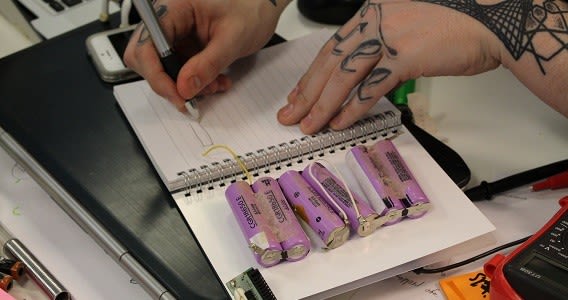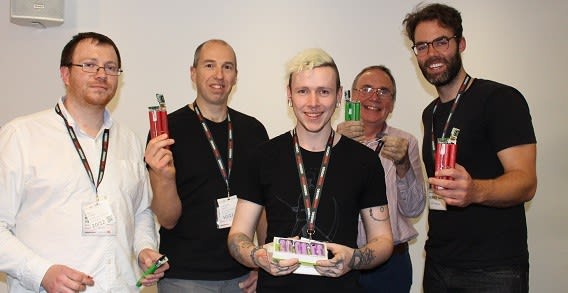POWER HACK: TEAM KILBY
Follow articleHow do you feel about this article? Help us to provide better content for you.
Thank you! Your feedback has been received.
There was a problem submitting your feedback, please try again later.
What do you think of this article?
Introducing Team Kilby to the POWER HACK! Consisting of industry leading experts:
Matt Johnson (Bare Conductive)
Mike Meakin (LPRS)
Clemens Valens (Elektor)
Nick Cripps (Arcola Energy)
Adam John Williams (Professional Hacker/Maker/musician)
Their challenge is to create an domestic electricity generator which is affordable and easy-to-produce in the 3rd world. What will they design? Follow Team Kilby on Tuesday 9th & Wednesday 10th December to find out more.
Day One AM:
Discussing a concept around utilising old lipo batteries from laptops to create a modular powerbank station that accepts batteries of varying form factors. These will be connected up together and charged up from the local power grid when running.
Day One: PM
Team Kilby are creating a centrailised domestic generation system that charges individual power suppliers, giving power and control to a community where the local power grid system might be erratic or unreliable. The recharging station will be in a central location and will act as a master generator/energy bank for a number of houses.
The project is in two halves. The creation of a battery pack enclosure, and a charging station.
The enclosures (battery pack/case)
These will use discarded lithium iron batteries that have been reclaimed from various sources such as Laptop battery cells. The battery pack will have a multi purpose connector to allow them to connect and modularise all types of lithium Iron batteries. The battey pack enclosure itself will have a standard connecter but no charging circuitry. The enclosure design is being created in DesignSpark Mechanical, and will then be 3D printed.
The Charge Station
They are designing a charging circuit in DesignSpark PCB and will include a mating connector for charging the battery packs. The charge itself could be produced by the motion of gravity to generate enough power to charge a battery pack.
As I type, they've already designed and printed a prototype of the connector using our DesignSpark Mechanical software.
Phenomenal!
Day Two: AM
The team has split into two tasks. The first is creating a simple battery pack enclosure that allows users to plug together cells. The cells will be taken out of old laptop battery enclosures or other battery pack types. The enclosure design will be self explanatory in terms of how cells are loaded into it. The enclosure will also be reusable so that any dead cells can be replaced. They have used razor blades as battery contacts.
To help with their prototypes, the team aquired a load of old laptop batteries from the London Hackspace last night! The enclosures for the battery pack will be designed to have a common connector, that makes it easier for charging and installing in the home.
Day Two : PM
The second team is designing the charging circuit for the master charge station where people will take there battery pack to be charged. The idea is that they could swap a flat battery for a charged one.
Their idea of recycling e-waste and turning it into a community-led battery charging scheme showed true innovation in engineering.
What the team had to say about the event...
Clemens Valens… "I have really enjoyed the Power Hack event. It is quite amazing what can be achieved when you lock a few people up for two days and feed them only mini Mars bars and coffee. The projects presented at the end were not only very impressive, they were worked out in quite some detail as well. I also very much enjoyed working with the others guys (next time bring in some girls too) and I look forward to meeting them again at a future event."
Mike Meakin…" As a 'veteran' electronics engineer it was an honour to be invited to the RS DesignSpark Power Hack at Google HQ. To participate was an utter delight and immense fun!
After an enlightening and encouraging talk from Neil Noble of our joint host the 'Practical Action' charity, we learned how people's lives from the developing world could be greatly improved by simple devices that generated 'off grid' electrical power.
It was the three competing teams task to conceive, design and perhaps build a demo within the two days of the event. From the start our team (Kilby) 'buzzed and sparked' with really great ideas and eventually decided upon a scheme to salvage and reuse old laptop batteries. These were to be tested and then re-assembled into compact packs to provide an efficient, portable and versatile source of stored electric power.The packs could be charged either locally or at a central station and used to power a variety of devices from essential reading lamps to more frivolous entertainment devices.
Before long designs for component parts were being sketched using 'DesignSpark Mechanical' software and then being fabricated on the supplied 3D printers. Similarly DesignSpark PCB proved to be a useful tool for circuit design of chargers and other electronics.
At the end of the first day we continued our discussions and shared our enthusiasms over a most enjoyable evening meal (and not inconsiderable drink) at a local restaurant.
On the second day there was frantic activity as we were all really put under pressure by the looming deadline of presentations marked by an ever-ticking projected countdown clock. At 'Zero Hour' the teams made their presentations and waited upon the deliberations of of the judges who deservedly awarded Team Maxwell as the 'winners'.
In fact, we were all 'winners' as everybody who participated took away a sense of community and just what can be achieved when human beings work together as a team for the 'common good'.
Personally, I came away greatly impressed and encouraged that this generation of young engineers were full of great ideas and had the expertise and engineering knowledge to turn those ideas into reality."











